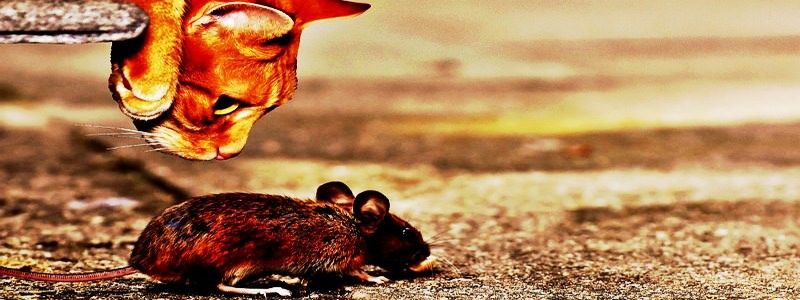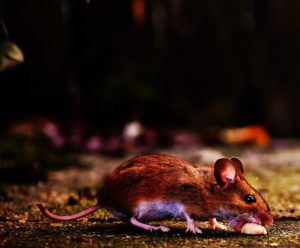
Are Cats A Reliable Mice Control Solution?
Posted by Jared Houliston Tuesday, March 14th, 2017 | 11,044 Reads
Have you hired a cat soldier to march your mice problems out of town? If so, continue reading because you could be in for a surprise once you learn the downside of relying on a furry feline to help you with your mouse control issues.
One of the biggest misconceptions about controlling mice problems is that if you get a cat to hunt down mice, all your mice problems will be fixed. Actually the opposite is true. First and foremost, the most effective, long term and humane way to treat a mice infestation problem is by running your home through a thorough inspection regiment combined with the application of permanent preventative measures.
The longstanding myth
The myth that cats are great at mice control is long standing and for good reason because at one point in history – and only in certain circumstances – it actually was a good pest control solution. Not so for modern day home owners that live in cities and suburbs. Using a cat to control mouse problems is simply not efficient or effective of a solution as it once used to be, and many studies and findings have shown it’s actually a dangerous practice.
Unfortunately that myth is still quite prevalent and in the end it leaves many home owners feeling frustrated, and many cats being abandoned because they ended up not being good enough for the job. You can do a simple search for various terms related to using cats to catch mice and rodents, and you’ll find endless articles and blog posts boasting that the practice works. The problem is there’s a lot they’re not telling you, and only a professional mice removal company actually could.
Why cats shouldn’t be used to catch mice
If you’re not convinced that mice and rodents shouldn’t be controlled by the presence of a cat, read the following critical points to consider:
- mice nest and burrow deep in our walls, in our attics, basements, and in places where cats have absolutely no way of reaching them
- because they can’t be accessed by cats, mice freely gather food, live peacefully and continue to breed more mice
- cats simply cannot get in behind walls and in attics where mice are prevailant
- mice can contract and become infected with toxoplasmosis through contact with cat feces and pass the disease onto humans
- studies have shown that mice infected with toxoplasmosis become more brazen and less afraid of cats
- the parasite toxoplasmosis makes mice crave cat urine (read more about Toxoplasma gondii here)
- because of the potential for contracting toxoplasmosis, cats can actually attract other larger numbers of mice to a home
- more than 60 million men, women, and children in the U.S. carry the Toxoplasma parasite
- mice are out site 99% of the time
- it has been observed that cats don’t actually deter mice, but instead attract them, and without being professionally prevented from entering a home, they’ll always be present
If you’re a farmer, there are also a number of other detrimental factors that come into play like dwindling mice predators, and upsetting the balance of the local habitat through an increase in “cat to rodent to disease” density ratios.
The home inspection requirement
 In an average home there can be over 20 holes that mice chew out and use to go in and out of.
In an average home there can be over 20 holes that mice chew out and use to go in and out of.
They’re usually quite secluded, hard to find, and they lead into a whole other world where the population easily grows.
“Working cats” as they are called, can occasionally catch and play with the mice they find but they can’t find all their entry holes. Cats aren’t looking for mice holes.
If you rely on a cat to solve your mice and rat problems, you should basically expect your cat to never be able to retire.
The only way you’re going to permanently stop mice and rodents from entering your home is by hindering them at their source of entry i.e. example exclusion prevention on the home.
To do this a full inspection of your home is required. Once the inspection is complete, and the locations in the home they are residing in is determined, removal of the mice can take place.
From there we move onto the next step – applying permanent preventative measures.
Applying permanent mice preventative measures
 Applying wildlife entry prevention measures is the only permanent solution to keeping mice and other wildlife out of your home.
Applying wildlife entry prevention measures is the only permanent solution to keeping mice and other wildlife out of your home.
Prevention entails repairing parts of the home that have been damaged by mice, and sealing up all their entry points after they have been investigated and discovered.
This solution is so successful that most accredited wildlife removal and pest control companies actually offer some form of a guarantee on their services, and frankly, as a home owner, taking this route is the only responsible course of action you should take.
You’ll be protecting your home from disease, giving your family cat a break, and you won’t have to worry about seeing a mouse scurry across your kitchen counter in the middle of the night every again.
By hiring a wildlife removal company to secure your home through pest exclusion work, you are adding an insurance policy to your home against future intrusions, diseases, and costly repairs.
The humane solution
Frankly put, it’s inhumane to allow a family pet to be put at risk of contracting or spreading a disease. On another note, no one wants to encounter a chewed up mouse, anywhere, at any time.
Hiring a mice removal company that utilizes humane pest control measures will ensure all parties involved are treated with respect and ensure your home will be permanently rid of nuisance wildlife once and for all.
Ontario Wildlife Removal Inc. provides wildlife removal and pest control in Southwestern Ontario, including Brantford, Kitchener-Waterloo, Cambridge, Guelph, London, Woodstock, Tillsonburg, Simcoe, Port Dover, Paris, St. George, Six Nations, Caledonia, Burlington, Waterdown, Oakville, Hamilton, Stoney Creek, Grimsby, & Niagara Region. Our methods are safe, humane and environmentally friendly. Call today to book your inspection.
Get a Pest Control Quote
Simply fill in your details below and we'll call you very shortly to discuss your issues.





Leave a Reply